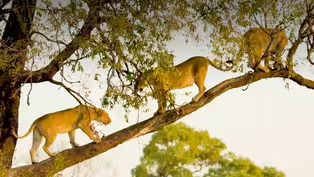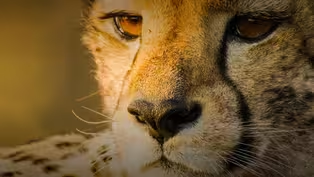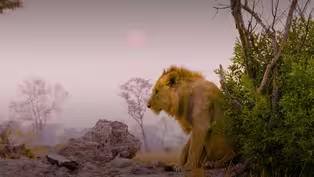
Big Cats Unleashed - Why Being a (Big Cat) Parent is Not Easy
Special | 8m 40sVideo has Closed Captions
Lions, leopards and cheetah are breeding successfully in the Okavango Delta, Botswana, but how?
In this episode, we meet the huge Xudum lion super pride has been doing very well lately, and therefore have had the opportunity to further expand their family. With 15 cubs currently in this pride, these brand new lions are stumbling their way through their first stage of life. But the path is fraught with peril, and the odds are against these little cubs’ survival.
Problems playing video? | Closed Captioning Feedback
Problems playing video? | Closed Captioning Feedback

Big Cats Unleashed - Why Being a (Big Cat) Parent is Not Easy
Special | 8m 40sVideo has Closed Captions
In this episode, we meet the huge Xudum lion super pride has been doing very well lately, and therefore have had the opportunity to further expand their family. With 15 cubs currently in this pride, these brand new lions are stumbling their way through their first stage of life. But the path is fraught with peril, and the odds are against these little cubs’ survival.
Problems playing video? | Closed Captioning Feedback
How to Watch Big Cats 24/7
Big Cats 24/7 is available to stream on pbs.org and the free PBS App, available on iPhone, Apple TV, Android TV, Android smartphones, Amazon Fire TV, Amazon Fire Tablet, Roku, Samsung Smart TV, and Vizio.
Providing Support for PBS.org
Learn Moreabout PBS online sponsorshipMore from This Collection
Big Cats Unleashed is a new exclusive series of short films exploring the Big Cats of Botswana. Featuring unseen moments and shots from Big Cats 24/7, Big Cats Unleashed builds upon the characters we’ve met, taking a deeper look into their lives.
Big Cats Unleashed - Why Are Africa's Big Cats Climbing Trees?
Video has Closed Captions
In the Okavango Delta, all three of these big cats are taking advantage of an aerial position. (6m 31s)
Big Cats Unleashed - Can we save Africa's Big Cats?
Video has Closed Captions
Lions, leopards and cheetahs are threatened across their ranges. But they're thriving in Okavango. (6m 20s)
Big Cats Unleashed - Why These Lions are Outcasts in Their Pride
Video has Closed Captions
Young lions are taking their first steps into becoming adults. (8m 29s)
Providing Support for PBS.org
Learn Moreabout PBS online sponsorship(cub growling) - The Xudum pride are actually experiencing what I would call a baby boom.
They've got 15 cubs at the moment.
That is absolute magic.
First thing in the morning, we've got six absolutely beautiful cubs just playing around their water hole.
Yeah, it's pretty special.
- [Narrator] It's not easy being a parent, from floods to predators to struggles on the hunt.
Big cats go through a lot to raise their young.
This area of the delta is dominated by a huge pride of lions, so large it's known as a Super Pride.
Our team of filmmakers have been following these lions as well as their rival leopards and cheetahs for six months, giving us an incredible look at what it takes for these cubs to survive and thrive in the delta.
(dramatic music) The Okavango Delta in Botswana is an oasis of life in the heart of the Kalahari desert.
(hyena whimpering) It has become one of the last strongholds for Africa's lions, leopards and cheetahs.
The "Big Cat's" team had been following them around the clock, spending time with these incredible predators like never before.
Now, delve even deeper into their intimate lives with "Big Cats Unleashed."
(dramatic music ending) (lion roaring) (light music) - [Gregory] Have you done a count?
- [Anna] I started to, but I ran out of fingers.
(Gregory laughing) - There's quite a few.
- [Anna] There's so many cubs that it's just impossible to count.
That is absolutely amazing.
(cubs mewling) They actually kinda remind me of little ducklings just waddling along behind their moms.
- Lions and lion cubs are probably the most successful at staying alive out here.
They are apex predators.
They rule the area and their survival rates are a lot higher than the other cats in the area.
- They're really lucky in that they've got the support of the pride members, so there's a definite strength in numbers.
- In terms of taking care of the cubs, the males don't really do much.
What they are good at doing is protecting the cubs by patrolling the territory.
When it comes to the females, they do share the load a lot, especially the moms.
- And Lionesses do this really unusual thing, which is called allo-suckling, which basically means that a cub can suckle from any of the lionesses and therefore share the burden amongst them.
- [Narrator] While following the baby boom on the delta.
The team couldn't help but get drawn in by the antics of one, particularly mischievous cub.
(cub squealing) - This young boisterous male always seems to be quite active.
- Mathata, it's a nice way to say a problem or a troublemaker in a friendly way.
- [Vianet] Oh, all right, okay, in a friendly way.
- [Reatile] In a friendly way.
- Yeah, so Hakuna Matata.
(both chuckling) Developing a sense of strength, curiosity.
It's a way of learning, isn't it?
- Yeah, yeah, yeah.
It's good life skills for him to learn now.
I hope he just relaxes on his siblings a little bit.
(both chuckling) (light music) - He is one of the larger cubs and he just has a way of bulldozing into every single situation.
- But I mean, Mathata is showing so much character, you know, he lives up to his name, Trouble.
He's very confident, very playful.
He'll make a really good king of the savanna, - [Narrator] But as the floods finally reach the delta, the pride has been less successful at hunting and even when they succeed, the cubs don't always get their fair share.
- Recently we've seen the females struggling with the hunt, and I was really concerned about Mathata 'cause he lost so much weight.
You can see his ribs sticking out.
- I think one of the biggest disadvantages of having such a big pride is whenever the kill is made and they need to feed them, not everybody's gonna get fed.
Bigger is not always better when it comes to the size of a lion pride.
- [Narrator] Some big cats grow up with a big social unit with all the good and bad that comes with it, but others have a different family structure like leopards, which are raised by single mothers.
- Leopards are particularly different to say, lions.
It's quite a difficult scenario.
She has a lot to balance.
- [Narrator] The crew went to extreme lengths to capture these images, footage of wild leopard cubs this young is extremely rare.
- You have no idea how happy I am right now.
What an absolute joy.
Trist, Brad?
- [Tristan] I have my binoculars on your screen.
This is insane.
- Her game is all about concealment.
It's about finding a place to give birth that is relatively secluded and protected.
- The mum will often dump them there, go off hunting, come back during the day and they visit the den quite a lot and it's completely safety thing.
They move their dens quite a lot just to keep their cubs safe as well.
One of the biggest risks out here to leopards and to their cubs is actually other leopards, sadly.
- It's likely she's upset with the situation here around this den, lion activity or potentially another leopard.
Pretty tense times, but nice to know that she's on a mission.
- It's competition.
It's always competition with these animals, so by moving the den lot, she masks the scent and just gives them a little bit of a better chance.
These big cats are so, so delicate with their cubs.
It's actually quite remarkable.
- [Narrator] The leopards may be delicate with their cubs, but that isn't always mirrored in other species in the delta.
Big cats are so gentle with their cubs, but circumstances are not always so gentle with them.
The team has also been following a cheetah mother called Pobe, who against all odds, has recently raised a cub to independence.
- To be able to do that in the territory of one of the largest lion prides in the Okavango and a habitat and landscape that is littered with leopards and wild dogs and hyenas, everything's going against her.
She's incredible.
The capacity to undergo all those challenges and still have raised offspring successfully and she makes it seem like it's just another day as a cheetah.
She's incredible.
- [Narrator] Despite all the pressures, Pobe's cub finally managed to grow up and leave home and this is no easy feat.
A cheetah's life is hard and a cubs survival is far from assured.
- Cheetah cubs, in my opinion, have the toughest start to life.
There's a lot against them.
Lions have a pride to protect them.
Leopards are able to stash their cubs in trees and all sorts of things and cheetah cubs are ground-based.
They have to be able to get moving quickly.
They have to be able to keep up with their mother, and because of it, it really, really affects the survival rates out here.
- If I were to choose to be an animal out here I definitely wouldn't wanna choose to be a cheetah.
I mean, she was scared of an owl today, the owl looked out and she looked up, but then probably backed away.
You can imagine if she's getting spooked by an owl, seeing the level of stress on that poor cat, day in, day out, every moment of the day.
And maybe she's not feeling anxious, because it's just part of her natural day.
But I'll tell you what, as a human being, if I was as stressed as she was, constantly, it wouldn't be a pleasant time.
- [Narrator] Due to this vulnerability, there's a theory that cheetahs have evolved an unbelievable adaptation to avoid unwanted attention.
- Cheetah cubs are probably the cubs that look least like their parents when they're born.
They have this incredible silver mantle that runs from the top of their head and down their back, and that makes 'em look like the notoriously fearsome honey badger, which essentially acts as a defense mechanism against other predators.
- [Greg] We don't often get a true appreciation of how they navigate the landscape, how they overcome the challenges, which are many, in a place like this.
It's exceptional to see.
- [Narrator] In the delta, parenthood is fraught with dangers, but these astonishing big cats find a way to be resilient against the threats, maintaining their dominance over the Okavango.
(wind blowing)

- Science and Nature

Explore scientific discoveries on television's most acclaimed science documentary series.

- Science and Nature

Capturing the splendor of the natural world, from the African plains to the Antarctic ice.












Support for PBS provided by:


